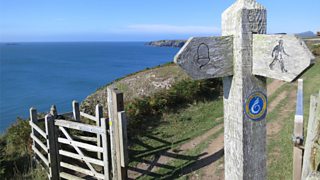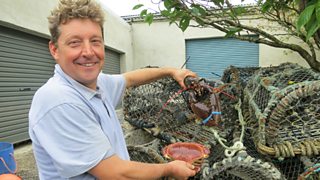When we got the go-ahead to make I thought, 'I've got to do it'. Firstly, because I know the area really well, and secondly, because it sounded like a great excuse to spend most of the summer on the Pembrokeshire coast. Let's face it, there are a lot worse places to film.
We originally worked up the idea at the start of 2012. Then the series was about the path itself plus the people who live and work on it, but as we started research it became evident that this should be a series about the people, not the path.
A lot of the work is done in the research and Sarah Morton (series assistant producer) did a great job spending a few weeks in Pembrokeshire, meeting and talking to locals to find the best characters and stories. She filmed them on a small camcorder and fed back to myself and executive producer Liz Lloyd-Griffiths.
We then chose who we wanted to ask to feature in the series. We had mapped it out as much as we could at that point and knew we wanted about 14 stories to follow. We were looking for a mix of great personalities and strong stories. The two are often hard to find together, but Pembrokeshire is full of fascinating people.

Path sign and path towards St Justinians
Filming started at the end of March this year. The first time you meet the people you are filming it's sometimes strange for both of you. You want to get to know them and they have a camera in their face. It's all about making the people feel at ease and relaxed on camera. If you're following someone over weeks or months you want them to end up almost forgetting you have the camera.
At this point I'd like to say how much we appreciate the people who put themselves forward to be in the series. Letting a camera into your lives and opening up, often about personal stories, isn't easy. Everyone I filmed with welcomed me with open arms.
Most of the time it was just me filming. Concentrating on directing, interviewing, sound and camera all at once can be a challenge, but the fact that it's just one person and a camera can work well for this kind of documentary. It makes the people you are filming feel more at ease and allows you to blend in to the background more than if there was a director, sound and camera.
When you're filming solo it's a balancing act, trying to capture the action as it happens and get the reactions and answers that you want. I let things happen and unfold, then throw in questions on the hoof, as people are getting on with whatever they are doing at the time. This makes for far more natural answers as they are focusing on what they are doing, rather than standing in an interview situation. I also ask as little as possible. Asking 'how are you feeling?' or 'what's going on?' gets a much better answer then a fuller, pressing question, as the subject has to explain and give a full answer.

Solva fisherman, Jono Vo
Through filming the series I got to travel the entire length of the Pembrokeshire coast and to know some great people. It was interesting to see the coast from the locals' perspective. Most of us are in holiday mode when we visit Pembrokeshire and don鈥檛 think about the realities of living there.
I noticed that a lot of locals stick to their own patch - they know everyone in their locality but hadn鈥檛 heard of the people I was filming with further up or down the coast, or hadn鈥檛 been to those parts of the path. For the locals, I hope it's a fascinating watch, seeing these other great people who also live on the Pembrokeshire path.
I finished filming the series at the start of September and went straight into the edit. It's taken 10 weeks to cut and editor Dean Smith has done a fantastic job. We map the structure of the programme out, starting with writing the script and putting in the bits of sound and interview/comments. Dean then performs his magic, adding the rest of the shots and music. It's a bit like putting a huge jigsaw together. Only there is no set pattern for which pieces go where.
We set out to make a fun and heart-warming series about the people who live, work and play along the Pembrokeshire coast. We hope we鈥檝e captured peoples' lives and the community spirit that exists in this amazing part of Wales.
Matthew Tune is the director, producer and cameraman for the new series , which starts on 成人论坛 Two Wales on Thursday 7 November at 7.30pm.
